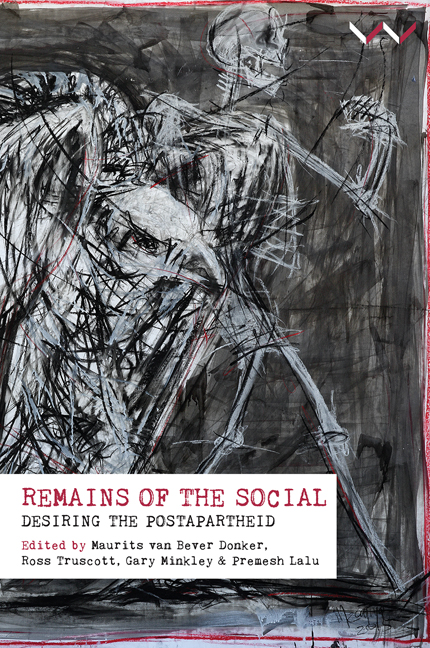Book contents
- Frontmatter
- Contents
- Acknowledgements
- Preface
- Chapter 1 Traversing the Social
- Chapter 2 The Mandela Imaginary: Reflections on Post-Reconciliation Libidinal Economy
- Chapter 3 The Return of Empathy: Postapartheid Fellow Feeling
- Chapter 4 The Ethics of Precarity: Judith Butler's Reluctant Universalism
- Chapter 5 Hannah Arendt's Work of Mourning: The Politics of Loss, ‘the Rise of the Social’ and the Ends of Apartheid
- Chapter 6 Souvenir
- Chapter 7 Re-Cover: Afrikaans Rock, Apartheid's Children and the Work of the Cover
- Chapter 8 The Graves of Dimbaza: Temporal Remains
- Chapter 9 The Principle of Insufficiency: Ethics and Community at the Edge of the Social
- Chapter 10 The Trojan Horse and the ‘Becoming Technical of the Human’
- About the Contributors
- List of Figures
- Index
Chapter 7 - Re-Cover: Afrikaans Rock, Apartheid's Children and the Work of the Cover
Published online by Cambridge University Press: 21 April 2018
- Frontmatter
- Contents
- Acknowledgements
- Preface
- Chapter 1 Traversing the Social
- Chapter 2 The Mandela Imaginary: Reflections on Post-Reconciliation Libidinal Economy
- Chapter 3 The Return of Empathy: Postapartheid Fellow Feeling
- Chapter 4 The Ethics of Precarity: Judith Butler's Reluctant Universalism
- Chapter 5 Hannah Arendt's Work of Mourning: The Politics of Loss, ‘the Rise of the Social’ and the Ends of Apartheid
- Chapter 6 Souvenir
- Chapter 7 Re-Cover: Afrikaans Rock, Apartheid's Children and the Work of the Cover
- Chapter 8 The Graves of Dimbaza: Temporal Remains
- Chapter 9 The Principle of Insufficiency: Ethics and Community at the Edge of the Social
- Chapter 10 The Trojan Horse and the ‘Becoming Technical of the Human’
- About the Contributors
- List of Figures
- Index
Summary
Ek's ‘n agtergeblewende
op die grasvelde van my kinderdae
(Fokofpolisiekar, ‘Kyk noord’)In an eight-part series of short videos released on their website chronicling the recording of their latest album, Bloed, sweet en trane, the lead vocalist, Francois van Coke, from the Afrikaans rock band Van Coke Kartel (VCK) explained what he deemed was the inspiration for the lyrics on the album:
I think it's like … that obviously comes across in the lyrics is like just, where life is at the moment. I think that's probably my main goal with the lyrics on this album is just to write about normal, everyday things … like what I'm experiencing … Ja, I think Bloed, sweet en trane is a collection of songs about a new chapter for me and the band, and the realisation that things like love and playing music with others and music makes you part of … something, even if you're very insignificant in the greater scheme of things (Eendag op ‘n slag).
VCK emerged after the break-up of the Afrikaans punk-rock outfit Fokofpolisiekar. Fokofpolisiekar's 2003 EP, entitled As jy met vuur speel sal jy brand, caused an uproar in conservative Afrikaans-speaking communities because of songs, such as ‘Hemel op die platteland’, which openly expressed an antireligious sentiment, so distancing the band from a fundamental tenet of Afrikaner nationalism (see Badprop; De Olim; Herholdt; Nel). Given the ways in which their music challenges the subject position of white South Africans in particular – specifically, Afrikaans-speaking white youth – after the democratic transition of 1994, the group has also been linked with a certain articulation of what it means to be white in a postapartheid South Africa constituted against the racialised apartheid past. Fokofpolisiekar, their music and their lyrics have been seen as marking an important moment in this shift in this set of debates, and their ‘contribution to the South African music scene with their questioning of white patriarchal South African values as well as their visceral and poetic use of the Afrikaans language, paved the way for a fresh alternative movement within South African music’ (Smit 2). Fokofpolisiekar has been seen by Sonja Smit as a direct antecedent of both the hip hop artist Jack Parow and the debate around whiteness in post-1994 South Africa.
- Type
- Chapter
- Information
- Remains of the SocialDesiring the Postapartheid, pp. 172 - 194Publisher: Wits University PressPrint publication year: 2017

